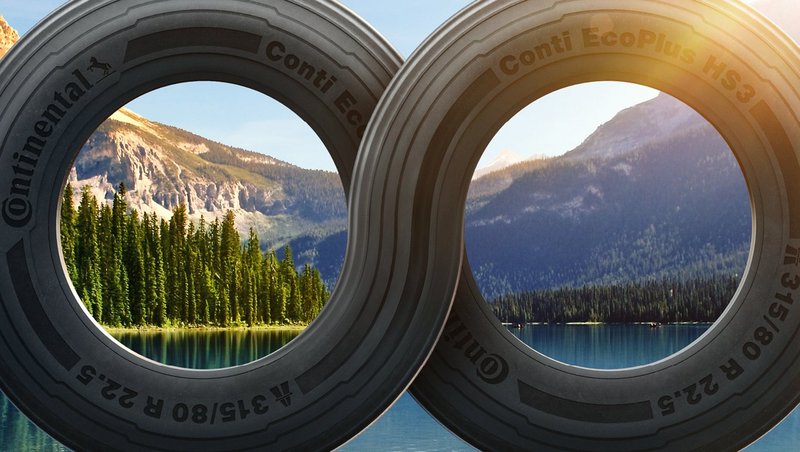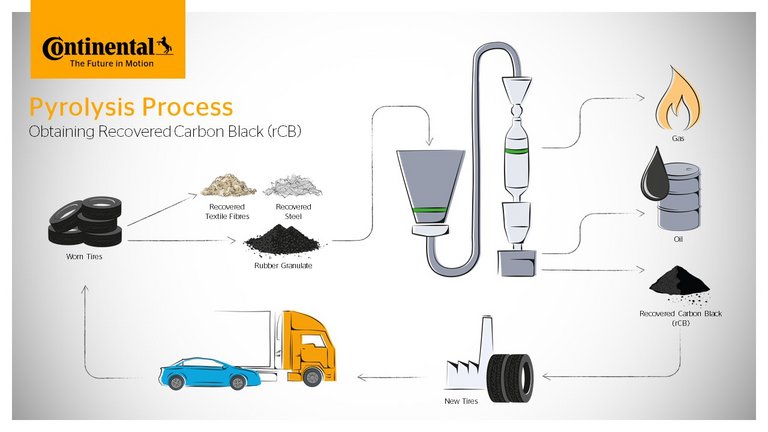Continental and Pyrum Innovations Further Expand Circular Economy in the Tire Industry
- Recycling of end-of-life tires by pyrolysis is further optimized and expanded
- Lower use of fossil raw materials and reduced CO2 emissions: Recovered carbon black from Pyrum will be used in Continental’s tire production in the future
- Long-term goal is a closed-loop recycling concept for end-of-life tires
- Continental aims to successively use 100 percent sustainably produced materials in its tire products by 2050 at the latest
Hanover, Germany, March 14, 2022. Continental is consistently expanding its activities in the area of circular economy. To this end, the premium tire manufacturer has signed a development agreement with Pyrum Innovations, a specialist in the pyrolysis of end-of-life tires. The aim of the collaboration is to further optimize and expand the recycling of end-of-life tires through pyrolysis. In the future, among other things, particularly high-quality recovered carbon black (rCB) is to be obtained for tire production of Continental. Carbon black is an important component of many tire compounds. By using high-quality carbon black, the performance of tires can be specifically improved. Continental's subsidiary, Reifen-Entsorgungsgesellschaft (REG), will begin supplying end-of-life tires from the premium manufacturer to Pyrum as early as March 2022. In the long term, the aim is to establish a circular economy concept for the recycling of end-of-life tires. Since Pyrum's IPO in 2021, Continental has already held a strategic minority stake in the company.
"In Pyrum we have found a partner who has developed a particularly efficient pyrolysis process. Together we want to further develop the processes for the pyrolysis of end-of-life tires. Our goal is to recover valuable materials and high-performance raw materials on an industrial scale in the future, among other things for Continental's tire production", explains Dr. Andreas Topp, Head of Materials- and Process Development and Industrialization at Continental Tires. He adds: "Continental has ambitious sustainability goals. It is important for us to conserve resources. That's why we are continuously expanding our solutions for the circular economy."
“We have been in close exchange with Continental for some time and are looking forward to further expanding our collaboration with this agreement. Our business model is already fully sustainable. Together with Continental, we now want to go the next step towards a sustainable tire industry", says Pascal Klein, CEO of Pyrum Innovations.
Industrial carbon black is an important resource used in tire production and in the manufacture of other industrial rubber products. Carbon black recovered from end-of-life tires saves fossil raw materials and will contribute significantly to reducing CO2 emissions. The specific use of carbon black in rubber compounds increases the stability, strength and durability of tires. In a standard passenger car tire, the amount of carbon black to which tires owe their black color is 15-20 percent.
Circular economy an integral part of Continental's sustainability strategy
Sustainable materials and circular economy are an important part of Continental's sustainability strategy. "End-of-life tires are a raw material for Continental in the wrong place. We believe that circular economy is the model of the future. Modern, highly efficient pyrolysis processes are very important to us in this regard", says Claus Petschick, Head of Sustainability at Continental Tires. He adds, "As part of our ambitious sustainability strategy, we will increase the use of sustainable materials in our tire products to 100 percent by 2050 at the latest, for which recycled materials will make a significant contribution. As part of a closed-loop system, tires will in future become the starting material for new tires."

Henry Schniewind
Head of External Communications
Continental Tires




